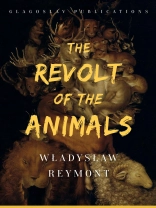’Don’t give up! I’ll help you!’ barks Rex, the hero of Władysław Reymont’s Revolt of the Animals (1924), 'carried away with wrath and compassion’ at the sight of his friend the old donkey with 'his head covered in a hempen sack, being whipped by boys harrying him towards a pit of lime.’ Who would not be roused to a righteous indignation at the sight of such wanton cruelty, inflicted upon a wise, sentient creature – for the perverse pleasure of man, that 'crown and lord of all creation, ’ to whom dominion over this world was supposedly given by the Lord at the dawn of creation? Certainly, the beasts of farmyard and field know better than anyone how gentle a master human beings can be, and so it is no surprise when this scene becomes the last straw for our patient, long-suffering quadruped cousins. 'Take everyone with you, ’ says Blackie, who – like most of the other animals on the farm, had remained impervious, up till now, to Rex’s urgings to revolt – 'everybody’s suffering the same misery, whips, and slavery. It’s eating away at us all.’
Thus begins the animal fable of the Polish Nobel Prize winner (1924), inspired by the Bolshevik Revolution in Russia, and the Polish-Soviet War, which had just ended a year before the novel was serialised in 1922. Banned in Poland during the Communist years and only republished in this century, The Revolt of the Animals is now made available to the English readership for the first time in the translation of Charles S. Kraszewski. Comparisons to George Orwell’s later novel Animal Farm will naturally arise in the reader’s mind – and often, to the advantage of Reymont.
O autorze
Władysław Stanisław Reymont (1867-1925) was a Polish novelist of the realist period (the period of 'Organic Work, ’ as it is known in Poland, for its rejection of revolutionism and its dedication to preserving Polish culture among the three partitions by work among the people), and, especially, the Young Poland period, often equated with 'Polish Modernism.’ He preferred to work as a labourer than to follow his parents’ wishes into higher education, training as a tailor and labouring on the railroad. His fame as a novelist is based on two works, the epic Chłopi [The Peasants, 1902-1908] and Ziemia obiecana [The Promised Land, 1897-1898]. In 1924 he received the Nobel Prize in Literature. Bunt [The Revolt of the Animals, 1922, 1924], his last major work, was suppressed by the Communist régime of the People’s Republic of Poland on account of its blatant rejection of Marxism and satirising of revolutions.












